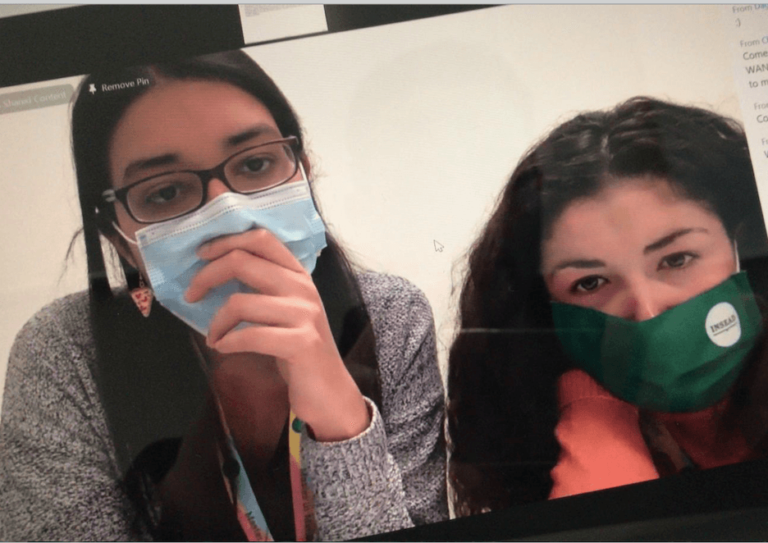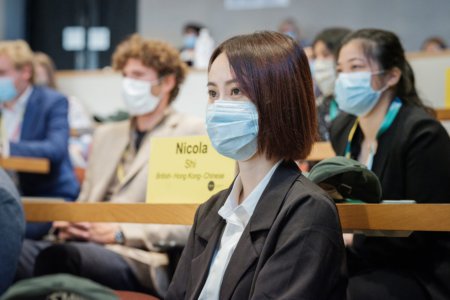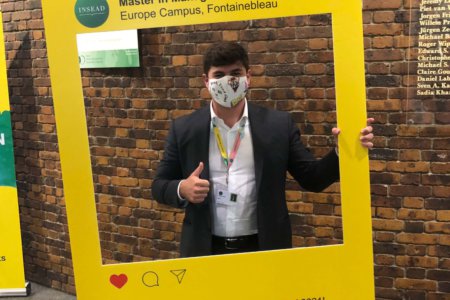
For five weeks, Mauritian Sonali Gobin had to wake up at 4 a.m. to join her Master’s in Management classes at INSEAD Business School by Zoom. Her visa had been held up for pandemic-related reasons and she wasn’t able to travel to its Fontainebleau campus.
Gobin finally arrived in France around a month later and six months later, she’s now continuing her Master’s in Management programme at INSEAD’s Asia Pacific outpost in Singapore. She says she is lucky to have such a strong pillar of support in her teachers and classmates at INSEAD. Below we talk to her about her life as a Master’s in Management student at INSEAD:
What made you choose to pursue your Master’s in Management at INSEAD?
I wanted an international experience after living in the US for seven years and having done my undergraduate programme there. The Master’s in Management at INSEAD gave me the chance to explore two countries which is what makes the programme unique.

Now at the Singapore campus of INSEAD, Gobin has exchanged her winter coats for tropical weather wear. Source: Sonali Gobin
Do you think it would have made a difference if you studied at a local institution?
I think the international, high-calibre education and network that I am getting at INSEAD is something that is very difficult to match, whether it’s an institution in Mauritius or in the US.
What has been your most memorable class thus far?
It has to be Managerial Accounting. This was interesting to me because of my prior undergraduate studies but mostly because Professor Young was such a good instructor.
He made the lessons very interactive and he broke down the most complex topics into digestible blocks. This class really helped consolidate my analytical toolkit which is something I hope to apply in my future career move.
Do you have any fond memories with teachers at your uni that you treasure?
This has got to be my Machine Learning & Operations course, it was quite hard for me because I did not have much prior coding experience. However, Professor Hall really simplified the most complex topics and was so patient when it came to re-explaining the same concept 10 times over.
At INSEAD, we really have a broad range of incredible professors who are experts in their fields but also care about the student body and making sure we feel supported in everything we do.
What are the practical learning elements in your Master’s in Management programme?
Definitely! Currently, the classes we are taking are: Strategy, Macroeconomics and Working in Teams. In a recent interview I had with a consulting firm, I used some frameworks learnt in my Strategy class to help answer the question.
Another practical aspect is the Negotiations module which really taught me how to be an effective negotiator. This has come in handy when it comes to negotiating starting salaries.
What memorable, non-academic experiences can you share with us so far?
It’s got to be meeting incredibly smart and driven like-minded individuals from all corners of the world.

“The MIM at INSEAD gave me the chance to explore two countries which is what makes the programme unique,” Gobin says about her uni. Source: Sonali Gobin
What do you plan to do with this degree after graduating?
I definitely intend to get my PhD down the line. But in the near future, I am on the job market currently looking for full-time positions in consulting and financial services.
What advice do you have for international students looking to study for their Master’s in Management at INSEAD?
If you are worried about fitting in, that should be the least of your concern! My MIM classmates have been extremely supportive. Because of COVID-19 and visa issues, I joined the class a few weeks later and was quite apprehensive that it would be hard for me to fit in. Everyone was warm and welcoming though!
Be ready and prepared to struggle, INSEAD is known to be a rigorous school and the programme itself is tough. There are going to be times where you feel overwhelmed, but remember that there is a great support system and everyone is cheering you on the way. Don’t be afraid to ask for help.
What did you like most about France?
Without a doubt: “Raclette” (a type of melted cheese dish)!
What’s the local food in France like compared to food back home?
That is a very hard question especially for someone who loves food as much as I do. My favourite food that I tried in France has got to be the pastry “Tarte tropézienne” (a brioche dessert pastry).
A close second has got to be gourmet crepes — although not something I discovered in France but I was happy to see that they were everywhere in Fontainebleau. I therefore don’t have a least favourite local food as France has delivered on its reputation of being a food country.
What’s one thing you missed from home and how did you substitute it?
I miss Mauritian food (the list would be too long to even start listing) but I am grateful that I had my aunt who lived in Paris and was able to cook for me when I was able to visit her.
Tell me about your hometown. What are the top spots?
I come from a small island called Mauritius (next to Madagascar). I would take you to Le Morne Brabant Mountain which is a UNESCO World Heritage site. The top of the mountain gives you a panoramic view of the ocean but mostly because of its strong historical connotations.
We would then go to Apravasi Ghat which is another historical physical landmark in Mauritius and we would then get into a whole conversation about this history of my country — a nation that speaks both French and English fluently.
Round it off with two fun facts about yourself:
I got stuck in the middle of the longest zipline in the Indian Ocean and my guilty pleasure is French reality TV shows.









